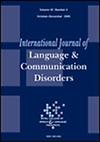Effectiveness of French Phonological Components Analysis in individuals with chronic aphasia
Abstract
Background
Over 50% of individuals with aphasia face ongoing word-finding issues. Studies have found phonologically oriented therapy helpful for English speakers, but this has not yet been studied in French. It is essential to assess the effectiveness of such a therapy in French, considering the distinct linguistic typologies between both languages, which may impact the outcomes of phonologically oriented interventions.
Aim
This paper evaluates the effectiveness of French Phonological Component Analysis (Fr-PCA) on communication skills of individuals with chronic aphasia and the impact of individual factors on treatment success.
Methods & Procedures
Eighteen individuals with chronic aphasia received 15 h of Fr-PCA therapy over 5 weeks. Naming accuracy for treated and untreated words was measured before and after therapy, as well as at 3- and 6-month follow-ups. Secondary outcome measures included standardized tests measuring within-level generalization (object and action naming) and across-level generalization (repetition, verbal fluency, oral comprehension, communication effectiveness reported by a frequent communication partner).
Outcomes & Results
Fr-PCA led to improved accuracy for treated (17 participants out of 18) and untreated words (9 participants out of 18), with gains maintained at 6-month follow-up (7 participants out of 10 for treated and 6 participants out of 10 for untreated), and generalization to communication effectiveness reported by a frequent communication partner (11 participants out of 16). Age, apraxia of speech severity and initial anomia severity impacted therapy gains.
Conclusions & Implications
Though more research is needed, results suggest Fr-PCA benefits French individuals living with aphasia. Identifying individual factors influencing therapy gains could enable clinicians to improve therapy tailoring.
WHAT THIS PAPER ADDS
What is already known on this subject
- Phonological Component Analysis (PCA) improves naming of treated and untreated items in individuals living with aphasia. There is also evidence supporting long-lasting benefits following PCA. However, PCA has never been studied in French, a language presenting with a different linguistic typology than English, and we know little as to which individual factors can influence PCA therapy benefits.
What this paper adds to existing knowledge
- Through group-level analyses on both personalized sets and standardized tests, this study shows that PCA constitutes an effective therapy protocol for francophone individuals living with aphasia. The gains are measured on treated and untreated items and generalized to levels other than naming, such as communication effectiveness. Individual factors such as age, initial anomia severity and apraxia of speech severity influence therapy outcomes.
What are the potential or actual clinical implications of this work?
- There is now evidence supporting PCA in French, a language with strong morphological-phonological interactions. Furthermore, when working with individuals living with aphasia and severe anomia or apraxia of speech, gains can still be made, but might be longer to attain.


 求助内容:
求助内容: 应助结果提醒方式:
应助结果提醒方式:


